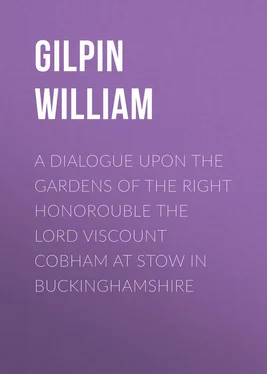William Gilpin - A Dialogue upon the Gardens of the Right Honorouble the Lord Viscount Cobham at Stow in Buckinghamshire
Здесь есть возможность читать онлайн «William Gilpin - A Dialogue upon the Gardens of the Right Honorouble the Lord Viscount Cobham at Stow in Buckinghamshire» — ознакомительный отрывок электронной книги совершенно бесплатно, а после прочтения отрывка купить полную версию. В некоторых случаях можно слушать аудио, скачать через торрент в формате fb2 и присутствует краткое содержание. Жанр: foreign_antique, foreign_prose, на английском языке. Описание произведения, (предисловие) а так же отзывы посетителей доступны на портале библиотеки ЛибКат.
- Название:A Dialogue upon the Gardens of the Right Honorouble the Lord Viscount Cobham at Stow in Buckinghamshire
- Автор:
- Жанр:
- Год:неизвестен
- ISBN:нет данных
- Рейтинг книги:5 / 5. Голосов: 1
-
Избранное:Добавить в избранное
- Отзывы:
-
Ваша оценка:
- 100
- 1
- 2
- 3
- 4
- 5
A Dialogue upon the Gardens of the Right Honorouble the Lord Viscount Cobham at Stow in Buckinghamshire: краткое содержание, описание и аннотация
Предлагаем к чтению аннотацию, описание, краткое содержание или предисловие (зависит от того, что написал сам автор книги «A Dialogue upon the Gardens of the Right Honorouble the Lord Viscount Cobham at Stow in Buckinghamshire»). Если вы не нашли необходимую информацию о книге — напишите в комментариях, мы постараемся отыскать её.
A Dialogue upon the Gardens of the Right Honorouble the Lord Viscount Cobham at Stow in Buckinghamshire — читать онлайн ознакомительный отрывок
Ниже представлен текст книги, разбитый по страницам. Система сохранения места последней прочитанной страницы, позволяет с удобством читать онлайн бесплатно книгу «A Dialogue upon the Gardens of the Right Honorouble the Lord Viscount Cobham at Stow in Buckinghamshire», без необходимости каждый раз заново искать на чём Вы остановились. Поставьте закладку, и сможете в любой момент перейти на страницу, на которой закончили чтение.
Интервал:
Закладка:
Gilpin, too, organizes his characters' responses in pictorial focus. The Advertisement again alerts the reader to these studied painterly aims. Once inside the gardens Callophilus sees pictures everywhere: variously disposed objects "make a most delightful Picture" (p. 14), while on at least three occasions in the first half-dozen pages the ruins, prospects, and "Claro-obscuro" of trees are discussed in terms that suggest how his habits of vision have been educated in front of painted or engraved landscapes which in their turn are recalled to provide a suitable vocabulary for his experiences. 14 14 This is an apt example of the psychological theory of sight proposed by E. H. Gombrich, Art and Illusion (New York: Pantheon, 1961).
Even Polypthon invokes the syntax of painting (pp. 25 and 41) to formulate his reactions to scenery.
It is in these painterly preconceptions of the characters and in Polypthon's account of Scottish scenery (pp. 23-4) that hints of Gilpin's later career are announced: the second edition of the Dialogue even talks of his "Observations" on Stowe, a term that became a standard ingredient in the titles of his picturesque tours. The education of sight by the study of paintings and prints was clarified and expounded in the Essay on Prints , written at least by 1758 and published ten years later. The picturesque tours themselves were started in the 1770s and published from 1782 onwards. In them Gilpin refines and enlarges upon the methods and ideas of his Stowe Dialogue . The adjudication between a taste for natural beauties (what his Three Essays term the "correct knowledge of objects" 15 15 Three Essays: On Picturesque Beauty; on Picturesque Travel; and on Sketching Landscape (London, 1792), p. 49.
) and the inclination to adjust them according to painterly criteria (in 1792 termed "scenes of fancy") is more sophisticated and consistent. He still delights in the variety of a landscape; but the roughness that Stowe only occasionally allowed becomes one of his guiding rules in appraising scenery.
Perhaps the most significant items in the Dialogue for readers of Gilpin's later writings will be his psychological emphasis and his attention to verbal and visual associations. Although his picturesque tours never entirely neglected the topographical obligation to describe actual localities, it is increasingly an imaginative response to landscape that is his concern. 16 16 Carl Paul Barbier, William Gilpin, His Drawings, Teaching and Theory of the Picturesque (Oxford: Oxford Univ. Press, 1963), pp. 71, 106 and 139.
In the Dialogue he explained how a good imagination will "improve" upon the sight of a grand object, just as Burke a few years later was to discuss the essential vagueness of the sublime and its appeal to the private sensibility. Polypthon's reactions at Stowe suggest something of this potential in contradistinction to Callophilus' ability to read the message of each temple or vista. What Gilpin displays in 1748 is more intricately adumbrated in the Three Essays of 1792: a scene may strike "us beyond the power of thought … and every mental operation is suspended. In this pause of intellect, this deliquirium of the soul, an enthusiastic sensation of pleasure over spreads it …". 17 17 Op. cit. , p. 49.
As the final pages of Dialogue suggest, that experience was also available in the gardens of Stowe.
But the more mature imagination in Gilpin is tempted simultaneously in two directions, which perhaps explains why one contemporary was moved to commend the published tours for being "the Ne plus ultra of the pen and pencil united." 18 18 Cited by Templeman, op. cit. , p. 228.
At Stowe he is attentive to the expressive potential of scenery and its associations ("The Eye naturally loves Liberty" [p. 54]), which are best expounded in the written commentary. But he also delights in the shapes and forms of scenery, the abstract qualities of the Stowe landscape that please the eye rather than the mind's eye. These are best recorded in his watercolours and the illustrations which become a main feature of his later books.
Bedford College
University of London
BIBLIOGRAPHICAL NOTE
The facsimile of [William Gilpin's] A Dialogue Upon The Gardens … At Stow (1748) is reproduced from a copy (Shelf Mark: 577.e.26[3]) in the British Library. The total type-page (p. 7) measures 156 x 94 mm.
A DIALOGUE UPON THE Gardens of the Right Honourable the Lord Viscount Cobham, &c
Polypthon was a Gentleman engaged in a way of Life, that excused him two Months in the Year from Business; which Time he used generally to spend in visiting what was curious in the several Counties around him. As he had long promised his Friend Callophilus to pass away his Vacancy, at some time or other, in Buckinghamshire , he determined upon it this Year; and accordingly paid him a Visit at * * *. Stow was one of the first Places where his Curiosity carried him; and indeed he had scarce got his Foot within the Garden-door, before he broke out into the following Exclamation.
Why, here is a View that gives me a kind of Earnest of what my Expectation is raised to!
It is a very fine one indeed (replied Callophilus :) I do not wonder it should catch your Sight: The old Ruin upon the left of the Canal, the Opening to the Pyramid, the View towards the House, the River, the beautiful Disposition of the Trees on the other side of it, and that venerable old Temple, make a fine Variety of Objects. But your Eye is so taken up with Views at a distance, that you neglect something here at hand very well worth your notice. What do you think of these two Pavilions?
Polypth. Why really they are light, genteel Buildings enough. I like these rough Paintings too; they are done in a very free, masterly Manner. Pray, Sir, do you know the Stories?
Calloph. They are both taken from Pastor Fido ; the disconsolate Nymph there, poor Dorinda , had long been in love with Sylvio , a wild Hunter, of barbarous Manners, in whose Breast she had no reason to believe she had raised an answering Passion. As she was roving in the Woods, she accidentally met his Dog, and saw her beloved Hunter himself at a distance hollowing, and running after it. She immediately calls the Hound to her, and hides it amongst the Bushes. Sylvio comes up to her, and enquires very eagerly after his Dog: The poor Nymph puts him off, and tries all her Art to inspire him with Love, but to no purpose; the cold Youth was quite insensible, and his Thoughts could admit no other Object but his Dog. Almost despairing, she at length hopes to bribe his Affections, and lets him know she has his Dog, which she will return if he will promise to love her, and give her a Kiss; Sylvio is overjoyed at the Proposal, and promises to give her ten thousand Kisses. Dorinda upon this brings the Dog: but alas! see there the Success of all her Pains: the Youth transported at the Sight of his Dog, throws his Arms round its Neck, and lavishes upon it those Kisses and Endearments, in the very Sight of the poor afflicted Lady, which she had been flattering herself would have fallen to her share. – On this other Wall Disdain and Love have taken different Sides; the Youth is warm, and the Nymph is coy: Poor Myrtillo had long loved Amarillis ; the Lady was engaged to another, and rejected his Passion. Gladly would he only have spoke his Grief, but the cruel fair One absolutely forbid him her Presence. At length a Scheme was laid by Corisca, the young Lover's Confidant, which was to gain him Admission into his dear Amarillis 's Company. The Lady is enticed into the Fields with some of Corisca 's Companions, (who were let into the Plot) to play at Blindman's Buff, where Myrtillo was to surprize her. See there he stands hesitating what use to make of so favourable an Opportunity, which Love has put into his Hands. – If you have satisfied your Curiosity here, let us walk towards the Temple of Venus . But hold: we had better first go down towards that Wilderness, and take a View of the Lake.
Читать дальшеИнтервал:
Закладка:
Похожие книги на «A Dialogue upon the Gardens of the Right Honorouble the Lord Viscount Cobham at Stow in Buckinghamshire»
Представляем Вашему вниманию похожие книги на «A Dialogue upon the Gardens of the Right Honorouble the Lord Viscount Cobham at Stow in Buckinghamshire» списком для выбора. Мы отобрали схожую по названию и смыслу литературу в надежде предоставить читателям больше вариантов отыскать новые, интересные, ещё непрочитанные произведения.
Обсуждение, отзывы о книге «A Dialogue upon the Gardens of the Right Honorouble the Lord Viscount Cobham at Stow in Buckinghamshire» и просто собственные мнения читателей. Оставьте ваши комментарии, напишите, что Вы думаете о произведении, его смысле или главных героях. Укажите что конкретно понравилось, а что нет, и почему Вы так считаете.












